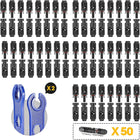How long does the solar panel last? And how to make your them last longer!

Everything dies–so do solar energy systems.
So, before making any commitments, you want to be sure a solar panel is a worthwhile investment.
To help you make a well-informed decision, this article discusses one commonly asked question among potential solar panel investors – how long do solar panels last?
This article discusses why solar panels decline and how to make yours serve longer.
How Long Can a Solar Panel Serve?
Averagely, solar panels can keep generating energy for up to 25 to 30 years. Although this doesn't necessarily mean your solar system will completely pack up after three decades, expect a significant output decline after this span.
Solar panels decline in bits and would have expended the better part of their essence after about two or three decades– depending on a few factors later discussed below.

Why Do Solar Panels Decline?
As it is with most technologies, and for various reasons, the output power of solar panels also decreases with time. This reduced output power is known as the degradation rate. In essence, the lower the degradation rate, the better the quality of solar panels.
One thing you should also take note of is that the degradation rate of solar panels also depends on the brand. For example, the degradation rate of solar panels issued by BougeRV team is basically below 0.5%.
If the degradation rate of your solar panel is 0.5%, it means that the output power of your solar panel will decrease at the rate of 0.5% per year. After 20 years, your panel continues to work at about 90% of the original power.
Most solar panels come with some warranty services, meaning that the manufacturer will guarantee that there are no manufacturing defects, in a bid to ensure the solar panels work to optimal satisfaction.

Now that brings us to the question of why solar panels degrade.
Several factors affect the degradation rate of solar panels which are listed below:
Weather: Extreme weather occurrences like hailstones landing on the panels may damage the anti-reflective glass coating on the surface of the solar panel. Similarly, heavy snow may also cause the panel to lose its original structure and accelerate its degradation.
Installation: It’s important to be mindful of how the ring and the panel are connected for the first time. Generally, when planning the solar panel array, the solar engineers should first consider the connection problem and the roof condition.
Therefore, when you are ready to install solar panels in your house, you must find a reliable installer, and Bouge RV after-sales team may be able to support you.
What are the Factors that Affect the Lifespan of Solar Panels?
Major contributing factors to solar systems’ degradation include:
Age
This is inarguably the most natural cause of solar panel performance decline. As time counts, expect natural wear and tear caused by exposure to factors including snow, rain, hail, ice, wind, and other extreme weather conditions.
Extensive exposure to these elements causes microcracks and disconnection of electrical chips, which, in turn, affect the system's performance.
So, even if your solar panel sits with little or no use, still expect degradation over time.
Light-induced Degradation, or LID
Light-Induced Degradation(LID), or Initial Degradation begins after your panel's first exposure to the sun, after installation. This unavoidable effect reduces the photoconductivity of the panel by 1% to 3% which further declines over time.
For this, some manufacturers build UV blockers to shield the installation against direct sun radiation.
Potential Induced Degradation(PID)
Extremely high voltages cause PID.
This decline usually occurs when the solar panel functions with fluctuating voltages. Such instability causes voltage leaks and reduces the volume of energy transmitted to the inverter.
PID rarely occurs, but when it does, your panel's performance may decline by as much as 30%–possibly more.

Product Quality
As with any product, the quality of your solar panel strongly determines its lifespan.
To build an expectation, check the manufacturer's warranty. Some products offer as long as 25 years –even more. When choosing between the available options, always remember the longer the warranty, the better.
Suppose your manufacturer offers a 25-year warranty. Knowing they'll be liable for any odd chances within this timeframe can be relieving.
So, you can sleep peacefully, knowing your investment is sure for [at least] 25 years. Otherwise, the panel's manufacturers would have a case to answer.
Installation
Poorly installed panels do not only degrade too quickly, but they also expose your property to several hazards, including electrocution and fire outbreak.
Solar panels are typically well built, but a roughly managed installation process may ruin their ruggedness and cause system failure.
Poorly wired systems and wrongly angled panels may altogether ruin your investment.
5 tips to extend the life of your solar panel
Check and maintain your solar panel regularly
For instance, when dirt and dust accumulate on the panel's glass, it weakens efficiency.
Other foreign objects (such as industrial waste and bird droppings) that build on the panel block sunrays and reduce performance. This calls for regular inspection and maintenance.
Besides, such checks also help ensure connections, inverters, and cabling are in place.
If you suspect your panel may have developed a fault (perhaps you noticed a drop in performance), first do a visual check. Look for signs of dirt build-up, a disconnect, or panel defect.
For dirty surfaces, use a brush with soft, flexible bristles and water to wash off the surface. Also, look around for trees that might have overgrown, now causing shades.
Keep your panel away from debris and other harmful substance
Certain external harmful substances can affect the service life of solar panels. These include; the accumulation of dust, pollen, leaves, and bird droppings. Though rain helps in cleaning your panel, it may also contribute to the accumulation of dust.
At the same time, when you install the solar panel for the first time, it is highly recommended you allow the installer to ensure that there is no shadow cast by trees or branches falling on the solar panel.
As long as you can avoid physical damage to your solar panels caused by the environment, they will continue to generate energy for many years, and their life may be more than 25 - 50 years.
Consider replacing the inverter after 10 years
Over about a decade of constant usage, you’ll notice a significant drop in your inverter's capacity.
Suppose your inverter is performing differently than before or experiencing a recurring issue. That signals a need for better, smarter technology.
When replacing, ensure you seek a professional guide on getting a good quality upgrade—perhaps with better capacity and the latest technology.
While it's ideal to change inverters after ten years, issues like inverters not charging, increased load requirement, and unpleasant noise during backup are other signs that say it's time for an upgrade.
Maintain and replace batteries
If you have a backup battery system in your solar system, it is also important to maintain and replace them regularly. Most lithium electronic and sealed lead-acid batteries need to be checked regularly.
Regularly rotate these batteries, so that each battery will have an equal amount of power output, thus extending the service life of the solar panel. It is also very important to avoid not charging the battery for a long time, otherwise, it will reduce the capacity of the battery.
Cooperation with trusted solar panel companies
It’s great luck if you have a reliable solar panel company, and BougeRV team is the company that doubles your luck.
Although the solar system does not require regular maintenance at a high frequency, our suppliers will provide you with good after-sales service throughout the warranty period of the product and the life cycle of the entire system, to ensure that they can efficiently power you for decades.
In addition, BougeRV team also has experienced solar installation engineers to provide you with the best installation guidelines.
Final thoughts
There is no doubt that the household solar charging panel is a relatively large investment, which is why we constantly launch corresponding topics on the official website to help you better understand the solar system, so that you can enjoy reliable and renewable solar energy resources in the future. Also, our experienced solar consultant team is on standby ready to answer your questions and meet your needs.
To learn more about us, visit: https://www.bougerv.com/




























































































































































































































